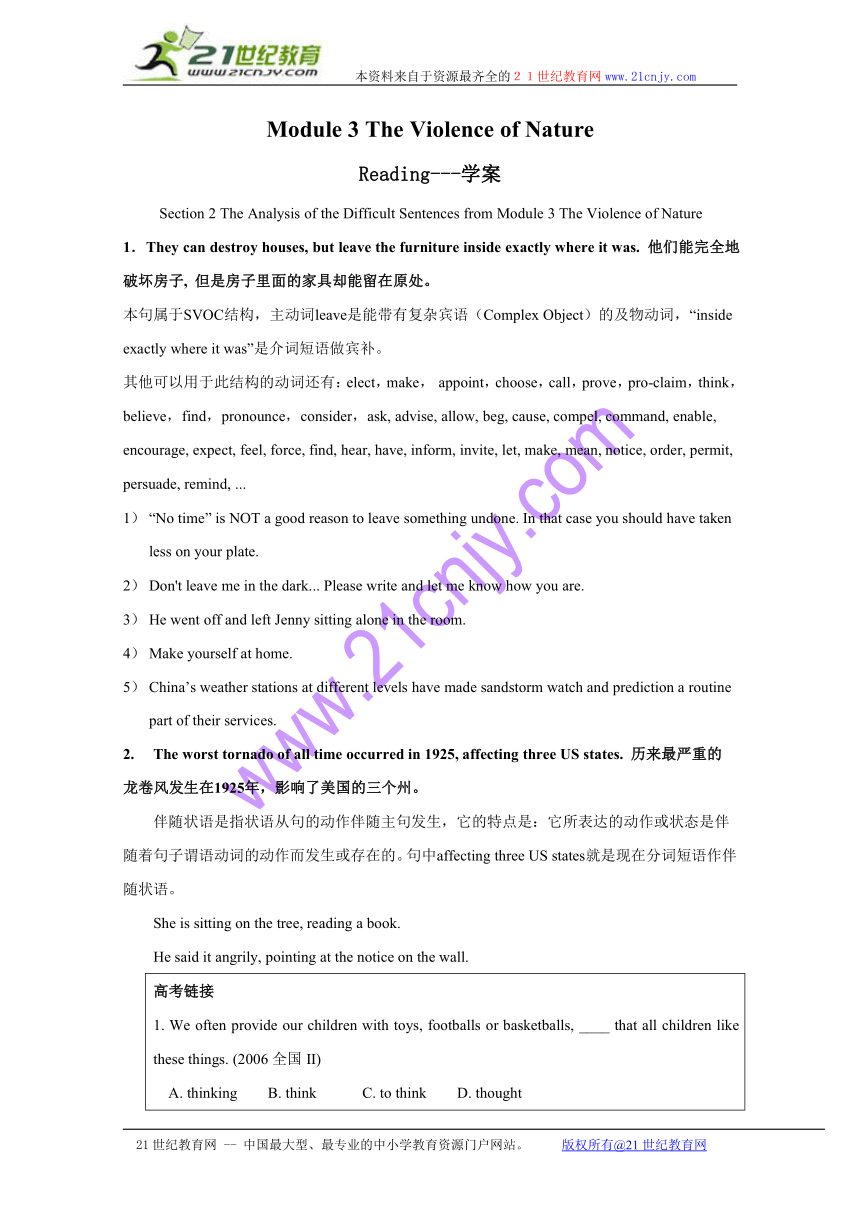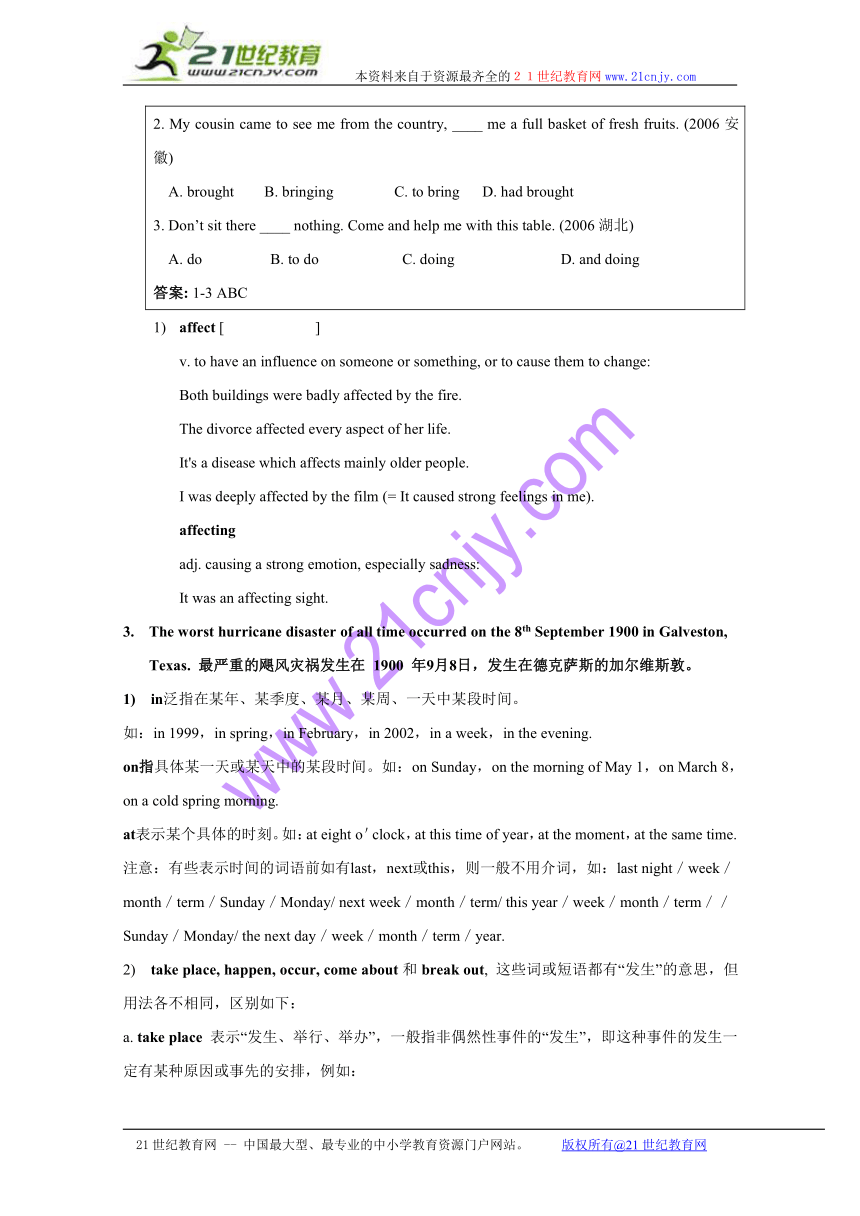英语:module 3《the violence of nature》学案-reading(外研版必修3)
文档属性
| 名称 | 英语:module 3《the violence of nature》学案-reading(外研版必修3) |  | |
| 格式 | rar | ||
| 文件大小 | 18.1KB | ||
| 资源类型 | 教案 | ||
| 版本资源 | 外研版 | ||
| 科目 | 英语 | ||
| 更新时间 | 2009-07-07 18:17:00 | ||
图片预览


文档简介
本资料来自于资源最齐全的21世纪教育网www.21cnjy.com
Module 3 The Violence of Nature
Reading---学案
Section 2 The Analysis of the Difficult Sentences from Module 3 The Violence of Nature
1.They can destroy houses, but leave the furniture inside exactly where it was. 他们能完全地破坏房子, 但是房子里面的家具却能留在原处。
本句属于SVOC结构,主动词leave是能带有复杂宾语(Complex Object)的及物动词,“inside exactly where it was”是介词短语做宾补。
其他可以用于此结构的动词还有:elect,make, appoint,choose,call,prove,pro-claim,think,believe,find,pronounce,consider,ask, advise, allow, beg, cause, compel, command, enable, encourage, expect, feel, force, find, hear, have, inform, invite, let, make, mean, notice, order, permit, persuade, remind, ...
1) “No time” is NOT a good reason to leave something undone. In that case you should have taken less on your plate.
2) Don't leave me in the dark... Please write and let me know how you are.
3) He went off and left Jenny sitting alone in the room.
4) Make yourself at home.
5) China’s weather stations at different levels have made sandstorm watch and prediction a routine part of their services.
2. The worst tornado of all time occurred in 1925, affecting three US states. 历来最严重的龙卷风发生在1925年,影响了美国的三个州。
伴随状语是指状语从句的动作伴随主句发生,它的特点是:它所表达的动作或状态是伴随着句子谓语动词的动作而发生或存在的。句中affecting three US states就是现在分词短语作伴随状语。
She is sitting on the tree, reading a book.
He said it angrily, pointing at the notice on the wall.
高考链接1. We often provide our children with toys, footballs or basketballs, ____ that all children like these things. (2006全国II) A. thinking B. think C. to think D. thought2. My cousin came to see me from the country, ____ me a full basket of fresh fruits. (2006安徽) A. brought B. bringing C. to bring D. had brought3. Don’t sit there ____ e and help me with this table. (2006湖北) A. do B. to do C. doing D. and doing答案: 1-3 ABC
1) affect [ ]
v. to have an influence on someone or something, or to cause them to change:
Both buildings were badly affected by the fire.
The divorce affected every aspect of her life.
It's a disease which affects mainly older people.
I was deeply affected by the film (= It caused strong feelings in me).
affecting
adj. causing a strong emotion, especially sadness:
It was an affecting sight.
3. The worst hurricane disaster of all time occurred on the 8th September 1900 in Galveston, Texas. 最严重的飓风灾祸发生在 1900 年9月8日,发生在德克萨斯的加尔维斯敦。
1) in泛指在某年、某季度、某月、某周、一天中某段时间。
如:in 1999,in spring,in February,in 2002,in a week,in the evening.
on指具体某一天或某天中的某段时间。如:on Sunday,on the morning of May 1,on March 8,on a cold spring morning.
at表示某个具体的时刻。如:at eight o'clock,at this time of year,at the moment,at the same time. 注意:有些表示时间的词语前如有last,next或this,则一般不用介词,如:last night/week/month/term/Sunday/Monday/ next week/month/term/ this year/week/month/term//Sunday/Monday/ the next day/week/month/term/year.
2) take place, happen, occur, come about和break out, 这些词或短语都有“发生”的意思,但用法各不相同,区别如下:
a. take place 表示“发生、举行、举办”,一般指非偶然性事件的“发生”,即这种事件的发生一定有某种原因或事先的安排,例如:
Great changes have taken place in our hometown during the past ten years.
The Olympic Games of 2008 will take place in Beijing.
The concert takes place next Thursday.
b. happen作“发生、碰巧”解,一般用于偶然或突发性事件,例如:
What happened to you (一般不说:What did you happen )
Maybe something unexpected happened.
I happened to see him on my way home.
= It happened that I saw him on my way home.
Fortunately it happened (that) there was no one in the house at the time of the explosion.
c. occur作“发生、想到、突然想起”解,其意义相当于happen,例如:
What has occurred (=What has happened )
A big earthquake occurred (=happened) in the south of China last month.
It occurred to me that she didn’t know I had moved into the new house.
If any of these symptoms occur while you are taking the medicine, consult your doctor immediately.
Sexism occurs in many workplaces.
It occurred to me that we should hire another secretary.
Nothing occurred that seemed important.
d. come about表示“发生、产生”,多指事情已经发生了,但还不知道为什么,常用于疑问句和否定句,例如:
When Mother woke up, she didn’t know what had come about.
I’ll never understand how it came about that you were late three times a week.
How did the problem come about in the first place
Do you know how the air accident came about
e. break out意思为“发生、爆发”,常指战争、灾难、疾病或者争吵等事件的发生,也可以表示突然大声叫喊等,例如:
Two world wars broke out last century.
A fire broke out in the hospital in the mid-night.
After the flood, diseases broke out here and there.
She broke out, “That is too unfair!”
Fighting has broken out all over the city.
4. By the late 1890s, he had moved to Galveston, where he died in 1899, a year before the hurricane struck.
句中“a year before the hurricane struck”是“1899”的同位语。同位语是指一个名词或代词后面有时可跟一个名词,或起类似作用的其他东西, 对前者作进一步解释,说明它指的是谁是什么等.有以下几种情况作同位词.
1) 名词作同位词,这种情况是最多的
This is Mr. Li, director of our hospital.
A neighbor, Fred Brick, is on the telephone.
That’s a whale, the world’s largest mammal.
The tickets cost five dollars each.
2) 形容词.数词.代词都可以作同位词,You two come and sit here. 你们俩到这里来坐。
3) 一个句子作同位词,即是同位词从句,通常由一些词来引导,如idea, fact, news, hope, doubt等,连接词为that或别的连接代(副)词,如I have no idea that you were here.
5. Eight years later, the coffin was found by fishermen in the sea near his home on Prince Edward Island in the east of Canada. 八年之后,棺材在加拿大的东部在爱德华王子岛上,离他家不远的海洋中被渔夫发现了。
句子中“in the sea”是主语补语, “near his home on Prince Edward Island in the east of Canada” 作sea的定语。
He was made monitor of our class. 主语补语monitor of our class;
The wall was painted white. 主语补语white;
He went to England a child and came back a well-known writer. 主语补语a child和a well-known writer。
He was found in an empty room, dead. in an empty room, dead作主语he的补足语。
The deer was caught alive.那只鹿被活捉,alive就是主语deer的补足语,说明这只鹿还是活的.
5. The Gulf Stream had carried it 3,000 kilometers up the eastern US coast to Prince Edward Island.
墨西哥湾流已经沿美国东海岸向北将它推进了3,000 公里,到达爱德华王子岛。
辨析along,down 和 up.作介词时,它们均能表示“顺着”,“沿着”,后面一般接表示河流,街道,道路的名词。如:Go down/along this road and take the first turning on the left. 沿着这条马路走,在第一个拐弯处向左拐。We often take a walk along/down/up the road. 我们经常沿着这条路散步。要注意的是:介词“down”有时含有“在下游”的意思,介词“up”则含有“在上游”的意思。如:The house is 300 meters up/down the river.房子在这条河上游/下游300米处。down含有离说话人而去的意思,介词up则含朝说话人而来之意,along 不强调方向。试比较:Who’s the man coming up/going down the road 沿着这条路走来/走去的那个人是谁?另外,介词up有向上之意,介词down则有“往下”之意。如:The cat is running up the tree. 猫正往树上爬去。The dogs are running down the hill. 狗正从山上跑下来。这三个词还可用作副词,意为“向前”,如:The farm is about 30 metres along.农场大约在前面30米远处。Please walk down. Don ' t come up.请往前走,别朝这儿来。
21世纪教育网 -- 中国最大型、最专业的中小学教育资源门户网站。 版权所有@21世纪教育网
Module 3 The Violence of Nature
Reading---学案
Section 2 The Analysis of the Difficult Sentences from Module 3 The Violence of Nature
1.They can destroy houses, but leave the furniture inside exactly where it was. 他们能完全地破坏房子, 但是房子里面的家具却能留在原处。
本句属于SVOC结构,主动词leave是能带有复杂宾语(Complex Object)的及物动词,“inside exactly where it was”是介词短语做宾补。
其他可以用于此结构的动词还有:elect,make, appoint,choose,call,prove,pro-claim,think,believe,find,pronounce,consider,ask, advise, allow, beg, cause, compel, command, enable, encourage, expect, feel, force, find, hear, have, inform, invite, let, make, mean, notice, order, permit, persuade, remind, ...
1) “No time” is NOT a good reason to leave something undone. In that case you should have taken less on your plate.
2) Don't leave me in the dark... Please write and let me know how you are.
3) He went off and left Jenny sitting alone in the room.
4) Make yourself at home.
5) China’s weather stations at different levels have made sandstorm watch and prediction a routine part of their services.
2. The worst tornado of all time occurred in 1925, affecting three US states. 历来最严重的龙卷风发生在1925年,影响了美国的三个州。
伴随状语是指状语从句的动作伴随主句发生,它的特点是:它所表达的动作或状态是伴随着句子谓语动词的动作而发生或存在的。句中affecting three US states就是现在分词短语作伴随状语。
She is sitting on the tree, reading a book.
He said it angrily, pointing at the notice on the wall.
高考链接1. We often provide our children with toys, footballs or basketballs, ____ that all children like these things. (2006全国II) A. thinking B. think C. to think D. thought2. My cousin came to see me from the country, ____ me a full basket of fresh fruits. (2006安徽) A. brought B. bringing C. to bring D. had brought3. Don’t sit there ____ e and help me with this table. (2006湖北) A. do B. to do C. doing D. and doing答案: 1-3 ABC
1) affect [ ]
v. to have an influence on someone or something, or to cause them to change:
Both buildings were badly affected by the fire.
The divorce affected every aspect of her life.
It's a disease which affects mainly older people.
I was deeply affected by the film (= It caused strong feelings in me).
affecting
adj. causing a strong emotion, especially sadness:
It was an affecting sight.
3. The worst hurricane disaster of all time occurred on the 8th September 1900 in Galveston, Texas. 最严重的飓风灾祸发生在 1900 年9月8日,发生在德克萨斯的加尔维斯敦。
1) in泛指在某年、某季度、某月、某周、一天中某段时间。
如:in 1999,in spring,in February,in 2002,in a week,in the evening.
on指具体某一天或某天中的某段时间。如:on Sunday,on the morning of May 1,on March 8,on a cold spring morning.
at表示某个具体的时刻。如:at eight o'clock,at this time of year,at the moment,at the same time. 注意:有些表示时间的词语前如有last,next或this,则一般不用介词,如:last night/week/month/term/Sunday/Monday/ next week/month/term/ this year/week/month/term//Sunday/Monday/ the next day/week/month/term/year.
2) take place, happen, occur, come about和break out, 这些词或短语都有“发生”的意思,但用法各不相同,区别如下:
a. take place 表示“发生、举行、举办”,一般指非偶然性事件的“发生”,即这种事件的发生一定有某种原因或事先的安排,例如:
Great changes have taken place in our hometown during the past ten years.
The Olympic Games of 2008 will take place in Beijing.
The concert takes place next Thursday.
b. happen作“发生、碰巧”解,一般用于偶然或突发性事件,例如:
What happened to you (一般不说:What did you happen )
Maybe something unexpected happened.
I happened to see him on my way home.
= It happened that I saw him on my way home.
Fortunately it happened (that) there was no one in the house at the time of the explosion.
c. occur作“发生、想到、突然想起”解,其意义相当于happen,例如:
What has occurred (=What has happened )
A big earthquake occurred (=happened) in the south of China last month.
It occurred to me that she didn’t know I had moved into the new house.
If any of these symptoms occur while you are taking the medicine, consult your doctor immediately.
Sexism occurs in many workplaces.
It occurred to me that we should hire another secretary.
Nothing occurred that seemed important.
d. come about表示“发生、产生”,多指事情已经发生了,但还不知道为什么,常用于疑问句和否定句,例如:
When Mother woke up, she didn’t know what had come about.
I’ll never understand how it came about that you were late three times a week.
How did the problem come about in the first place
Do you know how the air accident came about
e. break out意思为“发生、爆发”,常指战争、灾难、疾病或者争吵等事件的发生,也可以表示突然大声叫喊等,例如:
Two world wars broke out last century.
A fire broke out in the hospital in the mid-night.
After the flood, diseases broke out here and there.
She broke out, “That is too unfair!”
Fighting has broken out all over the city.
4. By the late 1890s, he had moved to Galveston, where he died in 1899, a year before the hurricane struck.
句中“a year before the hurricane struck”是“1899”的同位语。同位语是指一个名词或代词后面有时可跟一个名词,或起类似作用的其他东西, 对前者作进一步解释,说明它指的是谁是什么等.有以下几种情况作同位词.
1) 名词作同位词,这种情况是最多的
This is Mr. Li, director of our hospital.
A neighbor, Fred Brick, is on the telephone.
That’s a whale, the world’s largest mammal.
The tickets cost five dollars each.
2) 形容词.数词.代词都可以作同位词,You two come and sit here. 你们俩到这里来坐。
3) 一个句子作同位词,即是同位词从句,通常由一些词来引导,如idea, fact, news, hope, doubt等,连接词为that或别的连接代(副)词,如I have no idea that you were here.
5. Eight years later, the coffin was found by fishermen in the sea near his home on Prince Edward Island in the east of Canada. 八年之后,棺材在加拿大的东部在爱德华王子岛上,离他家不远的海洋中被渔夫发现了。
句子中“in the sea”是主语补语, “near his home on Prince Edward Island in the east of Canada” 作sea的定语。
He was made monitor of our class. 主语补语monitor of our class;
The wall was painted white. 主语补语white;
He went to England a child and came back a well-known writer. 主语补语a child和a well-known writer。
He was found in an empty room, dead. in an empty room, dead作主语he的补足语。
The deer was caught alive.那只鹿被活捉,alive就是主语deer的补足语,说明这只鹿还是活的.
5. The Gulf Stream had carried it 3,000 kilometers up the eastern US coast to Prince Edward Island.
墨西哥湾流已经沿美国东海岸向北将它推进了3,000 公里,到达爱德华王子岛。
辨析along,down 和 up.作介词时,它们均能表示“顺着”,“沿着”,后面一般接表示河流,街道,道路的名词。如:Go down/along this road and take the first turning on the left. 沿着这条马路走,在第一个拐弯处向左拐。We often take a walk along/down/up the road. 我们经常沿着这条路散步。要注意的是:介词“down”有时含有“在下游”的意思,介词“up”则含有“在上游”的意思。如:The house is 300 meters up/down the river.房子在这条河上游/下游300米处。down含有离说话人而去的意思,介词up则含朝说话人而来之意,along 不强调方向。试比较:Who’s the man coming up/going down the road 沿着这条路走来/走去的那个人是谁?另外,介词up有向上之意,介词down则有“往下”之意。如:The cat is running up the tree. 猫正往树上爬去。The dogs are running down the hill. 狗正从山上跑下来。这三个词还可用作副词,意为“向前”,如:The farm is about 30 metres along.农场大约在前面30米远处。Please walk down. Don ' t come up.请往前走,别朝这儿来。
21世纪教育网 -- 中国最大型、最专业的中小学教育资源门户网站。 版权所有@21世纪教育网
